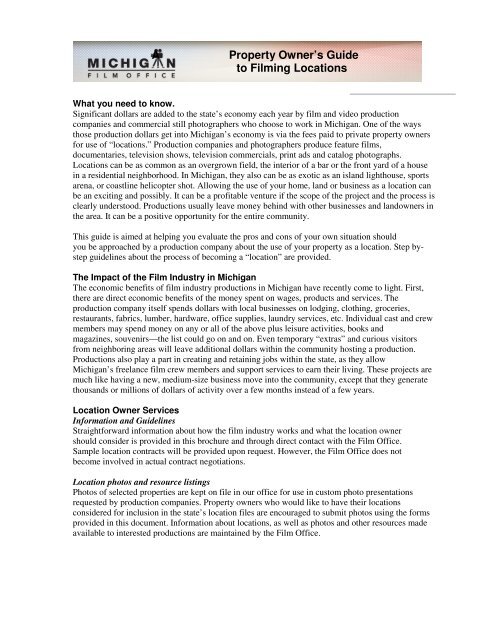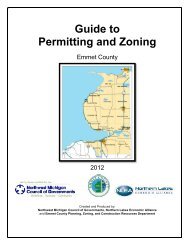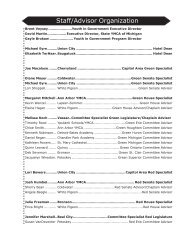A Property Owner's Guide to Filming Locations
A Property Owner's Guide to Filming Locations
A Property Owner's Guide to Filming Locations
You also want an ePaper? Increase the reach of your titles
YUMPU automatically turns print PDFs into web optimized ePapers that Google loves.
A <strong>Property</strong> Owner’s <strong>Guide</strong><br />
<strong>to</strong> <strong>Filming</strong> <strong>Locations</strong><br />
What you need <strong>to</strong> know.<br />
Significant dollars are added <strong>to</strong> the state’s economy each year by film and video production<br />
companies and commercial still pho<strong>to</strong>graphers who choose <strong>to</strong> work in Michigan. One of the ways<br />
those production dollars get in<strong>to</strong> Michigan’s economy is via the fees paid <strong>to</strong> private property owners<br />
for use of “locations.” Production companies and pho<strong>to</strong>graphers produce feature films,<br />
documentaries, television shows, television commercials, print ads and catalog pho<strong>to</strong>graphs.<br />
<strong>Locations</strong> can be as common as an overgrown field, the interior of a bar or the front yard of a house<br />
in a residential neighborhood. In Michigan, they also can be as exotic as an island lighthouse, sports<br />
arena, or coastline helicopter shot. Allowing the use of your home, land or business as a location can<br />
be an exciting and possibly. It can be a profitable venture if the scope of the project and the process is<br />
clearly unders<strong>to</strong>od. Productions usually leave money behind with other businesses and landowners in<br />
the area. It can be a positive opportunity for the entire community.<br />
This guide is aimed at helping you evaluate the pros and cons of your own situation should<br />
you be approached by a production company about the use of your property as a location. Step bystep<br />
guidelines about the process of becoming a “location” are provided.<br />
The Impact of the Film Industry in Michigan<br />
The economic benefits of film industry productions in Michigan have recently come <strong>to</strong> light. First,<br />
there are direct economic benefits of the money spent on wages, products and services. The<br />
production company itself spends dollars with local businesses on lodging, clothing, groceries,<br />
restaurants, fabrics, lumber, hardware, office supplies, laundry services, etc. Individual cast and crew<br />
members may spend money on any or all of the above plus leisure activities, books and<br />
magazines, souvenirs—the list could go on and on. Even temporary “extras” and curious visi<strong>to</strong>rs<br />
from neighboring areas will leave additional dollars within the community hosting a production.<br />
Productions also play a part in creating and retaining jobs within the state, as they allow<br />
Michigan’s freelance film crew members and support services <strong>to</strong> earn their living. These projects are<br />
much like having a new, medium-size business move in<strong>to</strong> the community, except that they generate<br />
thousands or millions of dollars of activity over a few months instead of a few years.<br />
Location Owner Services<br />
Information and <strong>Guide</strong>lines<br />
Straightforward information about how the film industry works and what the location owner<br />
should consider is provided in this brochure and through direct contact with the Film Office.<br />
Sample location contracts will be provided upon request. However, the Film Office does not<br />
become involved in actual contract negotiations.<br />
Location pho<strong>to</strong>s and resource listings<br />
Pho<strong>to</strong>s of selected properties are kept on file in our office for use in cus<strong>to</strong>m pho<strong>to</strong> presentations<br />
requested by production companies. <strong>Property</strong> owners who would like <strong>to</strong> have their locations<br />
considered for inclusion in the state’s location files are encouraged <strong>to</strong> submit pho<strong>to</strong>s using the forms<br />
provided in this document. Information about locations, as well as pho<strong>to</strong>s and other resources made<br />
available <strong>to</strong> interested productions are maintained by the Film Office.
Film Industry Services<br />
Location Research<br />
This includes location pho<strong>to</strong>graphy as well as information and assistance in finding and securing<br />
locations. An extensive pho<strong>to</strong> library is used <strong>to</strong> provide pho<strong>to</strong> presentations of Michigan locations<br />
that are cus<strong>to</strong>mized <strong>to</strong> meet the needs of inquiring production companies.<br />
Production Assistance<br />
Information and assistance regarding accommodations, equipment, transportation, crew members<br />
and local services are provided through direct contact and the Michigan Production Direc<strong>to</strong>ry.<br />
Liaison<br />
Information and assistance are offered with federal and state agencies, city offices and local<br />
businesses, as well as individual landowners and the general public.<br />
The Process of Becoming a Location—a Step-By-Step <strong>Guide</strong><br />
A request <strong>to</strong> use your property as a location is, in fact, a business proposal. Since each project has<br />
specific considerations, it is impossible <strong>to</strong> address all situations. However, the following<br />
guidelines should provide a basic foundation on which <strong>to</strong> establish an agreement between the<br />
property owner and the film company that is successful for everyone.<br />
• Initial contact is generally made by a location scout, or location manager. This person is often hired<br />
locally by the film company but also may be from out of state. His/her credentials can generally be<br />
confirmed through the Michigan Film Office.<br />
• Determine the nature of the project and how the location will be used. It is reasonable <strong>to</strong> ask<br />
<strong>to</strong> read the script segment where the property will be used. Will there be smoke, fire,<br />
gunshots or other effects?<br />
• Determine the exact number of days required for the shoot. Be aware that a “day” can be as<br />
long as 16 hours and can be either daytime or nighttime. Days required should include:<br />
• “Prep days” (preparation time before actual filming)<br />
• Days of actual filming<br />
• “Strike” days or “wrap” days after filming (the time needed <strong>to</strong> return the location <strong>to</strong><br />
the agreed upon condition)<br />
• Back-up days (also known as “cover set” days)<br />
• Arrange for a walk-through with the location manager <strong>to</strong> determine such<br />
specifics as:<br />
• Exact interiors and exteriors desired for filming<br />
• Where equipment and vehicles will be positioned or parked<br />
• Any “off-limits” areas as determined by the owner<br />
• Any areas (such as roof, trees, fences, windows) which may need <strong>to</strong> be used or altered<br />
during filming<br />
2
• Determine which personal property in or on the location is desired for use, how and where <strong>to</strong> s<strong>to</strong>re<br />
items not used, and who will be responsible for packing and moving items<br />
• Determine who will be allowed “on set” (location) during periods of use and how this will be<br />
enforced. A feature film or television movie may have a crew of 60 <strong>to</strong> 150 people; commercials may<br />
require 5 <strong>to</strong> 40 crew members; documentaries and video crews usually require fewer crew.<br />
• Determine rules and regulations regarding:<br />
• Smoking<br />
• Use of restrooms, water, electricity, kitchen, food, laundry, etc.<br />
• Where meals will be eaten<br />
• Trash collection and disposal<br />
• Floor coverings<br />
• Determine phone use and how the bill is <strong>to</strong> be covered ($20 upfront courtesy? All calls<br />
collect? Calls <strong>to</strong> production office only?)<br />
• Determine how the owner and family will be accommodated during location use and any<br />
living expenses that may be required.<br />
• Designate parking for personal vehicles.<br />
• Location fees are negotiable. The owner should feel comfortable with the amount agreed<br />
upon, and payment should be made in full prior <strong>to</strong> any filming. If the movie is legitimate, this should<br />
never be a problem.<br />
• The owner should have agreed-upon specifics IN WRITING.<br />
• The owner should get a certificate of insurance, including a hold harmless clause for<br />
protection in case of any injuries on the property. All production companies should carry<br />
insurance policies that cover third-party rentals for property damage and liability. A copy of<br />
the insurance certificate should be given <strong>to</strong> the owner before any crew comes on the property.<br />
• It is important <strong>to</strong> understand that, with the uniqueness of each film project, unforeseen<br />
circumstances or even weather changes can require more time, additional space, additional<br />
personnel, etc. This is the norm in making motion pictures, so contingency plans, options, and<br />
fees should be discussed with the production company.<br />
• Determine clean-up requirements: who is responsible, time limit for completion (such as 24<br />
<strong>to</strong> 48 hrs.), etc. Arrange for a final walk-through for owner approval.<br />
• Don‘t be afraid <strong>to</strong> ask a lot of questions! Make sure you fully understand the terms of the<br />
contract, and in turn, that your conditions are unders<strong>to</strong>od.<br />
Please contact the Michigan Film Office if you have any concerns or questions about your property<br />
being used as a location.<br />
Michigan Film Office, 300 North Washing<strong>to</strong>n Square, 4 th Floor, Lansing, MI 48913<br />
(800) 477-3456, mfo@michigan.org<br />
3

















